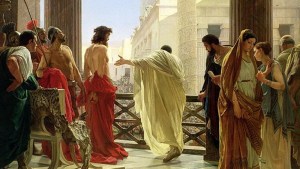Fear is a recurring theme in Scripture, presenting both a challenge and an invitation. The biblical concept of fear reveals a dynamic tension between awe and trust, calling believers to a deeper relationship with God.
Yirah: Awe and Reverence (יִרְאָה)
The Hebrew word yirah encompasses more than dread or terror—it signifies profound awe and reverence for God’s majesty and holiness. This is the fear praised in Proverbs 9:10: “The fear (yirah) of the LORD is the beginning of wisdom.” Such fear arises from recognizing God’s greatness and our own human frailty.
At Mount Sinai, the Israelites experienced this holy fear when they witnessed God’s presence in thunder and fire (Exodus 20:18–20). They trembled, but Moses reassured them: “Do not be afraid. God has come to test you, so that the fear (yirah) of God will be with you to keep you from sinning.” Here, yirah is not meant to drive people away from God but to draw them closer in obedience and trust.
Phobos: Holy Fear in the New Testament (φόβος)
In the Greek New Testament, phobos also carries a dual meaning. While it sometimes refers to terror, as when the disciples feared the storm (Mark 4:41), it often conveys reverence and awe before God. For instance, in Philippians 2:12, Paul exhorts Christians to “work out your salvation with fear (phobos) and trembling,” underscoring the seriousness of responding to God’s grace.
At the same time, Scripture repeatedly reassures believers with the words “Do not be afraid” (Mē phobeisthe). This phrase—or similar variations like “Fear not”—is found throughout the Bible and, some claim, is its most common command. Jesus often uses it to comfort His followers, such as in Luke 12:32: “Do not be afraid (Mē phobeisthe), little flock, for your Father has been pleased to give you the kingdom.” In this context, phobos is not eliminated but transformed by faith in God’s love and providence.
Fear and freedom
Biblical fear leads not to paralysis but to freedom. It is rooted in love and respect rather than punishment. The Catechism of the Catholic Church explains, “Filial fear is the fear of a son who offends his father, not because he fears punishment, but because he fears breaking the bond of love” (CCC 1828). This kind of fear inspires trust, devotion, and a life lived in harmony with God’s will.
Christ’s perfect love, revealed on the Cross, ultimately drives out fear (cf. 1 John 4:18). When believers hold God in proper awe, fear of worldly concerns diminishes, replaced by a bold faith that proclaims with the psalmist, “The LORD is my light and my salvation—whom shall I fear?” (Psalm 27:1).
By embracing yirah and phobosin their proper sense, Christians are invited to cultivate a faith that stands in awe of God’s majesty yet rests securely in His love. This holy fear is not the end of the spiritual journey but the beginning of wisdom, leading to freedom in Christ.
This article draws upon insights from the Etymological Dictionary of Biblical Hebrew: Based on the Commentaries of Samson Raphael Hirsch and the Etymological Dictionary of Greek (2010) by Robert Beekes. Commentaries are informed by these sources but are not exhaustive or definitive. Readers are encouraged to consult the original texts for deeper study and context.



